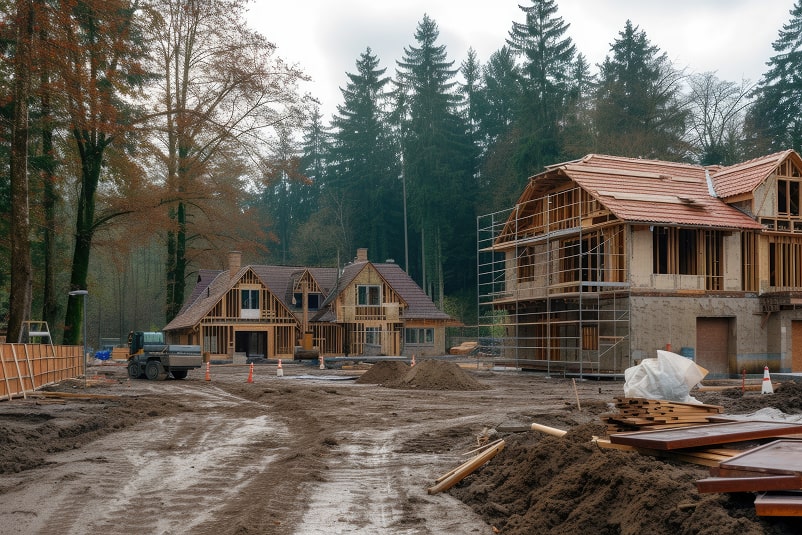Introduction to Development Finance
What is development finance and how does it work. This is a type of short term loan, interest-bearing and designed to help fund property development projects ranging from ground-up builds to conversions, refurbishments, and mixed-use schemes.
Unlike traditional mortgages, a development finance loan is structured in stages, releasing funds in drawdowns as the development project progresses. This means funds are released as each stage of the project is completed, providing financial flexibility throughout the project’s lifecycle.
Lenders typically assign a monitoring surveyor to approve each stage before releasing the next tranche of funds. This ensures the project remains on budget and on schedule. A development finance loan is structured so that funds are released as the development project advances, allowing developers to manage cash flow effectively.
Loan amounts are typically based on the current value or property value at the time of application, and lenders also consider the expected value or finished property value (GDV) when determining how much to lend. At the end of the loan term which can vary depending on project complexity, typically ranging from 6 to 24 months, the borrower repays the loan using profits from the sale or refinance of the completed property.
With staged drawdowns, funds are released at each stage, and developers only pay interest on the funds released. There is also the option to roll up interest and pay it as a lump sum at the end of the loan term, rather than making monthly payments.
Loan amounts can cover up to 100% of building costs and between 60% and 75% of the Gross Development Value (GDV), depending on the lender and the borrower’s experience. Building costs can be fully funded, and development finance can cover a wide range of development projects.
Who Can Benefit From Development Finance?
Development finance is suitable for a wide range of clients, including:
Professional property developers working on small or large-scale projects
Self-builders with planning permission and the desire to construct their own homes
Buy-to-let landlords looking to expand or redevelop their portfolio
Commercial investors converting offices or industrial space into residential use
First time developers who may face unique challenges and need to demonstrate strong planning and a professional team
Experienced developers whose expertise and track record can help secure better financing terms and facilitate more complex projects
Development finance can be used for projects ranging from a single unit or one property to large-scale developments, including residential properties.
Whether you’re transforming a plot of land into residential housing or converting a former warehouse into apartments, development finance gives you access to the capital needed to get your project off the ground.
Types of Development Finance Available
1. Bridging Loans
These short-term loans are commonly used to purchase land or property while a longer-term development loan is arranged. The loan amount is typically determined by the current value of the property at the time of application. They can also be used to bridge a gap in funding or finance quick purchases at auction.
2. Ground-Up Development Loans
Tailored for building new residential or commercial properties from scratch. Ground-up development loans are customised to the unique requirements and timelines of each development project. Funds are released in stages tied to construction milestones and certified by a surveyor.
3. Refurbishment and Conversion Finance
Ideal for projects involving the refurbishment of an existing property or the conversion of commercial spaces into residential units. Refurbishment and conversion finance can be used for property refurbishments, ranging from cosmetic upgrades to significant structural changes such as large-scale building conversions or major repairs.
These loans often have quicker approval times and lower interest rates than full development finance. Light refurbishment projects, such as redecorating or upgrading kitchens and bathrooms, typically do not require compliance with building regulations, while major works or significant structural changes may do so.
4. Mezzanine Finance
This secondary form of funding helps cover shortfalls between your primary loan and total project costs. It usually comes with higher interest rates but can reduce your personal capital outlay.
5. 100% Development Finance / Joint Ventures
Typically available to experienced developers, these structures involve a lender funding the entire project in exchange for a share of the profits. In these arrangements, the development project can be fully funded by the lender, covering all major costs such as land purchase and construction. Ideal for high return projects where the developer lacks upfront capital.
6. Regulated Development Loans
These are required when more than 40% of the completed property will be occupied by the borrower or their family. Regulated loans come under stricter oversight and provide added consumer protection.
The Development Finance Process
The development finance process is designed to provide property developers with the flexible funding solutions they need to bring their projects to life. It starts with the developer preparing a comprehensive proposal, which includes details about the property development, such as the project’s scale, scope, expected costs, timelines, and evidence of planning permissions.
This proposal is submitted to potential lenders, who then assess the viability of the development by reviewing the developer’s experience, the strength of the business plan, and any potential risks involved.
Once a lender is satisfied with the proposal, they will agree on the loan terms and structure the property development finance to suit the specific needs of the project. Unlike traditional property finance, development finance loans are typically released in stages, known as drawdowns.
Each stage of funding is tied to the completion of key milestones in the development process, and funds are only released after a monitoring surveyor confirms progress. This staged approach helps manage risk for both the lender and the developer, ensuring that funding is aligned with the actual progress of the project.
Throughout the project, the developer only pays interest on the funds that have been drawn down, rather than the total loan amount. This can significantly improve cash flow and reduce the overall cost of borrowing.
At the end of the project, once the development is complete and all loan conditions have been met, the developer repays the loan usually through the sale of the property or by refinancing with a longer-term loan. This process ensures that property development finance remains a practical and adaptable funding solution for a wide range of development projects.
Development Exit Strategies
Having a clear development exit strategy is essential for property developers to ensure a smooth transition from construction to profit realisation. The most common exit strategy is to sell the completed development, which allows developers to quickly recoup their investment and potentially fund new projects.
Alternatively, some developers choose to refinance the completed development with a long term loan, such as a buy-to-let or commercial mortgage, enabling them to retain ownership and generate ongoing rental income.
Another popular option is to use development exit finance, such as a bridging loan, to extend the marketing period for the completed development. This approach can be particularly useful if the property market is slow or if the developer wants to avoid selling at a discount due to time pressure.
Development exit finance helps maintain healthy cash flow, giving property developers the flexibility to wait for the right buyer and achieve the best possible price for their completed development.
Choosing the right exit strategy depends on the specifics of the development, current market conditions, and the developer’s long-term goals. By planning their exit early and considering all available options, developers can maximise returns, manage risk, and ensure the ongoing success of their property finance ventures.
Pros and Cons of Using Development Finance
Benefits:
Access to larger projects with minimal upfront capital
Staged payments help manage cash flow efficiently
Specialist lenders understand property markets and development timelines
Flexible terms tailored to suit construction schedules and exit plans
Interest can often be rolled up, reducing monthly payment stress
Costs:
Higher interest rates than standard mortgages (usually 6–12% annually)
Arrangement fees, often 1–2% of the loan amount
Exit fees, sometimes 1% of the final loan balance
Surveyor and legal fees for monitoring construction and ensuring compliance
Rolled-up interest increases total repayment amount
Despite the costs, many developers find that the flexibility and speed of development finance make it a valuable tool for scaling projects and maximising profits.
Leading Development Finance Lenders
Here’s a selection of reputable lenders who offer development finance:
Most lenders have maximum loan amounts and timeframes that vary depending on the type of development project.
Lender | Loan Size | Project Types | Key Features |
|---|---|---|---|
MSP Capital | From £250k | Residential, conversions, ground-up | Up to 100% of build costs |
Assetz Capital | £250k–£25m | Residential & mixed-use | Peer-to-peer and institutional funding |
Hampshire Trust Bank | Various | Commercial and residential developments | Customised solutions |
Shawbrook Bank | Flexible | Residential, student housing, commercial | Competitive rates and rapid processing |
Avamore Capital | From £500k | Refurbs and new builds | Specialist in complex developments |
Paragon Bank | From £200k | Development and bridging loans | Strong broker relationships |
Fiduciam | Up to £25m | SME, commercial and residential projects | Flexible lending criteria |
Note: Loan sizes, terms, and interest rates vary depending on the borrower’s experience, project location, and exit strategy.
If you are applying as a limited company, you may need to provide additional financial and company information, such as details of existing debts, liabilities, and previous project experience.
Choosing the right lender is crucial to ensure your development finance solution matches your specific project needs and maximises your chances of successful funding.
What to Consider When Choosing a Development Finance Lender
When selecting a lender, it’s important to evaluate:
Loan-to-GDV and LTV ratios – How much will the lender finance relative to your project’s value? The value of the property is a key factor in determining borrowing limits, as lenders assess both current and future property value to set loan-to-value ratios.
Drawdown process – Are payments made smoothly and on time?
Monitoring costs – Who pays the surveyor, and how frequently are inspections required?
Exit strategy flexibility – Is refinancing, resale, or long-term hold permitted?
Speed of approval – Can the lender issue terms quickly to secure land or contracts?
Track record – Is the lender experienced with projects like yours?
Using a development finance calculator can help estimate loan amounts and repayment terms based on property value and specific project details.
Partnering with a knowledgeable mortgage broker can save time and secure better terms by comparing offers from multiple development finance lenders.
Support for First Time Developers
Entering the world of property development can be daunting for first-time developers, especially when it comes to securing the right development finance. Many lenders prefer to work with experienced property developers, which can make it challenging for newcomers to access funding for their projects. However, there is a growing recognition in the industry of the need to support first-time developers, and many development finance lenders and brokers now offer tailored guidance and funding solutions.
Specialist lenders often provide advice on preparing a strong development proposal, understanding the legal and financial requirements, and navigating the application process. Some lenders also offer development finance options specifically designed for first-time developers, such as joint venture partnerships or mezzanine finance, which can help reduce the amount of personal capital required and share the risks involved in the project.
By working with an experienced development finance team or broker, first-time developers can access valuable support and increase their chances of securing the right finance for their property development. With the right guidance and funding in place, even those new to the industry can successfully complete their projects and lay the groundwork for future property development success.
Final Thoughts: Is Development Finance Right for You?
Development finance is a powerful tool for property developers looking to build, refurbish, or expand their portfolios. It offers speed, flexibility, and access to capital that traditional loans often can’t match. If you need interim funding for your current project, there are options available to help manage cash flow, such as Development Exit Bridging Finance. With the right preparation, you can secure development finance quickly and efficiently.
However, it’s crucial to plan your project with realistic timelines and exit strategies, allowing for cost overruns, delays, and market changes. Always work with an experienced solicitor, quantity surveyor, and broker to structure your deal effectively, and ensure all legal aspects of your development finance transaction are properly managed.
Get help from an experienced mortgage broker.
You can speak to one of our specialist mortgage brokers who would be able to guide you through the process. They will advise if there is a lender available and the maximum loan amount based on your circumstances. We are a whole of market mortgage brokerage with access to all lenders. Call us on 01332 470400 or complete the form with your contact details for us to give you a call back.
Why Work with Option Finance for Commercial Mortgages?
At Option Finance, we specialise in mortgages for complex credit scenarios. Our team works with all major bad credit lenders and has access to exclusive deals that aren’t available on the high street.
Understanding one’s credit report from a credit reference agency can help in securing a mortgage.
Over 20 years of experience
Full market access to specialist lenders
Fast, honest, and personalised mortgage advice
Expert help with complex or recent credit issues
Showing our favourite reviews

Always attentive, helpful and efficient
Jonathan, 27 Jan 2025

Best Mortgage Broker in the UK!
Liam, 26 Nov 2024

Ben was really helpful in helping me…
George, 28 Aug 2024
FAQs
What is development finance?
Development finance is a type of short-term loan used to fund the construction, renovation, or conversion of residential or commercial property. It’s commonly used by property developers for projects ranging from single homes to multi-unit developments.
Who can apply for development finance?
Development finance is available to experienced developers and, in some cases, first-time developers with a solid plan and professional team. Lenders look at your track record, exit strategy, project viability, and financial strength.
How much can I borrow with development finance?
You can typically borrow up to 70–75% of the land/property value and 100% of the build costs, provided the total loan doesn’t exceed 65–75% of the Gross Development Value (GDV). Each lender may have different criteria.
How is development finance repaid?
It’s usually repaid in a lump sum at the end of the project, often through:
Sale of the completed development
Refinancing onto a long-term mortgage
Developer’s own funds
Interest is often rolled up, meaning you pay it all at the end, not monthly.
What do I need to apply for development finance?
You’ll typically need:
A detailed project plan and schedule
Planning permission (or evidence it’s in progress)
Cost breakdown and cash flow forecast
Exit strategy
Details about your experience and team
Some lenders also require a personal guarantee or additional security.
Ready to Take the First Step?
Whether you’re a first-time buyer, remortgaging, or moving home, bad credit doesn’t have to hold you back.
Understanding credit scoring can help you prepare for a mortgage application. You can speak to one of our specialist mortgage brokers who would be able to guide you through the process. They will advise if there is a lender available and the maximum loan amount based on your circumstances. We are a whole of market mortgage brokerage with access to all lenders.
































